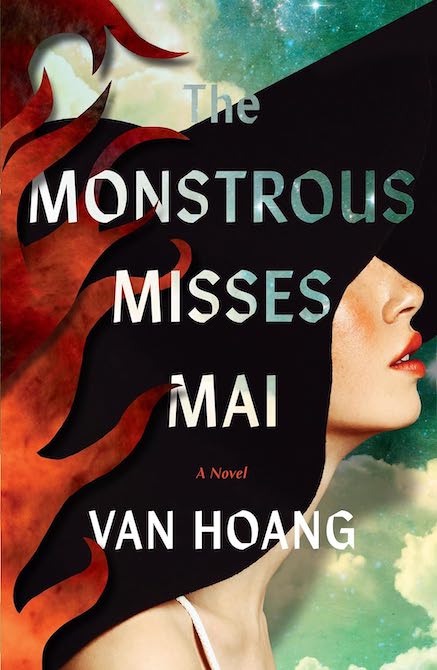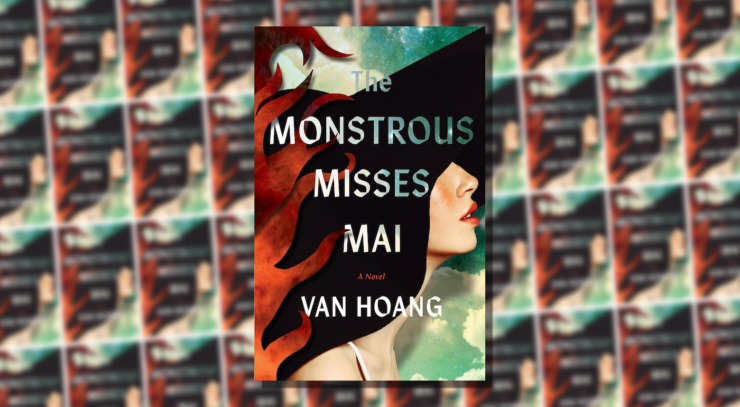Van Hoang’s first adult novel The Monstrous Misses Mai stars a young woman called Cordelia Mai Yin, who is the younger child of Vietnamese immigrants, the first of their children to be born in America, and the child on whom they’ve pinned a lot of hope. She helps her parents run their alterations shop in Chinatown, and dreams of one day designing women’s clothes herself, clothes with pockets in them all. But Cordi struggles to continue doing exactly as her parents demand of her, especially now that she is an adult who disagrees with how they run things.
After a particularly bad fight with her parents, Cordi is out on the streets of Los Angeles with her tiny savings and the certainty that she will never go back to her childhood home. While looking for affordable places to rent, she comes across the loft in an apartment rented by three other Asian girls, Tessa, Audrey and Silly. A charming but sketchy blonde man called Callum has somehow managed to get all four girls into this apartment, at rents they can afford. Each of the girls is alone, attempting life independent from their families, trying to do something that isn’t common for young Asian women in LA at that time: Tessa wants to be a mainstream model, Audrey a painter, Silly wants to work for the Mayor, and Cordi can barely voice her dreams of being a fashion designer. All four girls also share the middle name Mai—for reasons unknown, and validity unexplained.
Before they know it, the four young women are involved in what is essentially a magic Ponzi scheme, headed by Callum. The Lura magic system he introduces them to is straight forward enough—a sacrifice is required for each wish, and in the usual be careful what you wish for/monkey’s paw way. ‘It’s just a few little wishes—to give us a leg up’, says Tessa. ‘You don’t think everyone else out there hasn’t had some sort of help? People born into rich families or people who are well connected? This is just us helping ourselves’.
It starts with a small sacrifice, but the change isn’t permanent, and as the girls’ desire for more success grows, so do their sacrifices. Callum doesn’t give them many details, of course, but this much is clear—he stands to benefit in some way from every spell the girls conduct. He also recognises that there is something special, stronger about Cordi’s abilities, since the magic appears to benefit her the most, and the fastest. Her trajectory from being a nobody working at a random old fabrics shop to designing a capsule collection for the city’s most influential and richest heiress is exponential. But that seems to mean she will also sacrifice the most, in the shortest period of time. That is when we see some level of body horror in the novel—hair falling out, blackening fingertips, loss of eyesight. Most of it is mild, but it goes further with Cordi, as her star keeps rising. When and how will it end? And who will pay the final price?
Buy the Book


The Monstrous Misses Mai
Cordi isn’t the most likeable of characters—not because she’s a morally corrupt or straight old terrible person, but because she does tend to be a little desperate, and almost continuously anxious and incapable of ever stepping out of that anxiety, which makes her feel a little one dimensional, since we don’t see any substantial evolution for the character during most of the book, and instead see a sudden big pivot in the denouement. She’s continuously desperate for the cool girl Tessa’s undivided attention, though Tessa clearly abuses their friendship for her advantage at times. It’s not exactly clear why Cordi’s envy of Tessa being friendly with Silly, for example, is even relevant to the plot—it does remind us of Cordi’s anxieties, but it doesn’t really endear us to her, add much depth to her, or drive the plot along. Perhaps Cordi is just desperate for what she thinks a loving relationship with a sister looks like, that she gives in to all of Tessa’s selfish demands, or perhaps she just doesn’t know that friendships need to be fully reciprocal, but either way, she is pushed along by Tessa often, landing up in embarrassing situations. This can be seen as the exploration of a toxic friendship, or an indication of Cordi’s anxiety but it doesn’t quite add the depth needed.
The story is told from Cordi’s perspective, so we are continuously aligned with her, and accept her to be the special one even before she is told she is. It is unfortunate then, that she is often just a weak character—not to say she isn’t developed or doesn’t evolve (she is and she does… eventually), but that she doesn’t invite any particular empathy. We are told again and again about her petty jealousies, how she feels cut off from her family, how she has no money, no job, no prospects, how lonely and sad and miserable she is—all of which starts to make Cordi seem like a small-minded, immature child. Most of the girls’ behaviour tends to be naive, which can be written off them having had little exposure to big city life, but Cordi repeatedly reminds everyone who assumes her to be an immigrant that she was born and raised in LA. It does though, add to the idea of young women of colour’s exploitation by a straight white man hungry for personal power and social relevance. In that, The Monstrous Misses Mai does well, as it does with the sensitive subject of breaking away from the burden of immigrant parental expectations.
The most obvious comparisons of this novel are to 1996 movie The Craft, since The Monstrous Misses Mai also revolves around four young women who exist on the margins of their society and venture into magics unknown because they want mainstream success or popularity very, very much. But of course, since this is LA in the 50s, Hoang’s young women are also fighting sexism, racism, societal judgement and exploitation. There is plenty of potential simmering under the surface of the novel, but a great deal remains unexplored.
The book is at times a love letter to both the 1950s and the particular aesthetic of that time, and to Los Angeles. There are some great scenes that drive this home, and that’s where Hoang’s writing really shines—her descriptions of a city buzzing with life:
Around her, the noise of Los Angeles thrummed—people shouted at one another, and a mind coloured car whooshed past, sunlight glinting off the metal trim of the bumper. A Red Car rattled down its tracks in the distance, punctuated by the clack of a woman’s heels like a never-ending ellipsis. Construction seemed constant, filling the air with the persistent drone of machinery, dust adding to the smog that forever clouded the atmosphere. The smell of exhaust mixed with the aroma of fried chicken from a restaurant around the corner.
Did the story need to be set in the 50s to be told? Possibly not, but it makes it more fun that it is. The Monstrous Misses Mai is a cute, easy, if unevenly paced read, with enough socio-political commentary and family trauma to allow many readers to find a connection.
The Monstrous Misses Mai is published by 47North.










